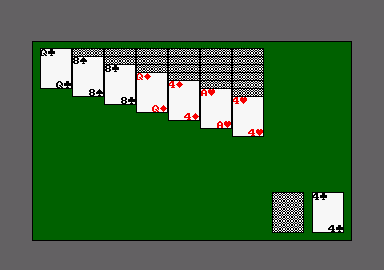THIS version of Patience is probably the best known but hardest to win. As with most games of Patience the object is to get rid of all your cards. There are two stages to the game. In the first you take cards from either your hand, or those already laid out in the starting position shown in Figure I, and replace them on top of cards in the table in descending order, alternating between red and black. In the second stage you can take cards from your hand or the table and bear them off on to separate piles in ascending order of the same suit  
Of course you can't start doing this until you have found the ace of the required suit with which to begin a bearing-off pile. The game is won when all the cards have been born off. If you cannot move, you can twist the cards in your hand, three at a time, in an attempt to find a card which might be of use. If you twist through your complete hand three times without playing, the computer assumes you are stuck, cannot play and have therefore lost. However if at any point you realise that you have lost, you can press E to end the game. To save you having to bear off all your cards when you have obviously won, the computer will tell you that you have done so and end the game. There are cases when you are allowed to move more than one card at a time. For example, if you take a look at Figure III you will see that it is possible to place the five of spades on the six of diamonds, carrying over the four of hearts with it. The same applies when moving any card which has other cards placed on top of it - all the cards are carried over to the receiving one. You may find it tempting to bear off whenever you can but this is not always a good idea as those cards you bear off may be useful for removing others from your hand. It is often more beneficial to leave bearing off until as late in the game as possible. I have made using the program as simple as possible. To make a move you simply type the number and initial of the card you choose, followed by the number and initial of the card you are moving it to. In the case of a 10 of any suit you can type either the 1 or the 0. There are two exceptions: If you select the ace of any suit it will automatically move to the bearing off pile. Likewise, if you select any king, and there is a free space for it, it automatically moves to that space. To twist your hand you press the spacebar. Any incorrect entries can be cancelled by pressing Delete and all illegal moves are ignored. CWTA | 
